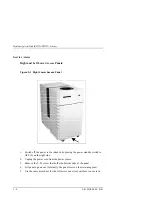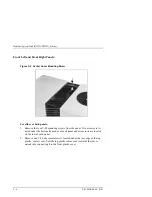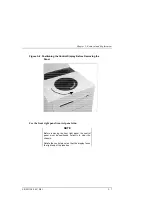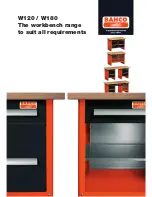
Chapter 4. Troubleshooting and Diagnostics
EK–MOL80–SV. B01
4–39
A failure to read a disk may result from:
•
hardware failure
•
contamination of the disk surface
•
contamination of the drive objective lens
In a service situation where contaminated disks may be a problem, ensure first
that failures are not caused by another, perhaps a hardware failure.
On an otherwise working drive, check to see that the most current firmware code
level is being used and/or that all applicable service notes have been done.
The following are recommendations for preventing contamination of disks and
the disk drive:
•
Place the jukebox away from high traffic areas.
•
Do not leave a disk in the drive for extended periods of time if possible.
•
Do not use the jukebox in “dirty” environments.
NOTE
SCSI-connectjukeboxes
If the problem appeared as loss of
performance and cleaning the disk solved the
problem, another couple of steps must be
done to regain performance using that disk.
As performance was declining because of
read/write problems, the disk was probably
becoming fragmented through excessive
“sparing”. To regain performance, the data on
each side of the disk should be stored, each
side of the disk reformatted, and the data
restored back on the disk.
LAN-connect jukeboxes
No additional actions need to be taken. The
server software automatically moves the data
to a new disk and removes the effects of
sparing. It does this through the Automated
LAN Jukebox Maintenance program.
















































